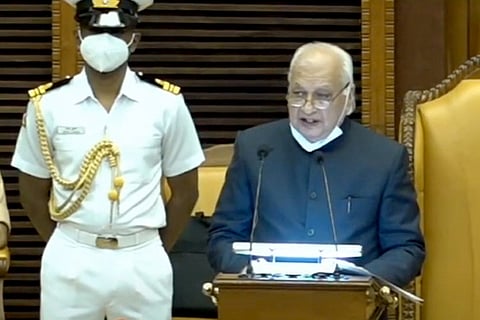

The first session of the 15th Kerala Assembly began on Friday, May 28, with the address by Governor Arif Mohammad Khan. The second Pinarayi Vijayan government was sworn in on May 20 while the Members of the Legislative Assembly took oath on May 25. MB Rajesh of the CPI(M) was elected Speaker on May 26. The Governor began his address with the welfare measures taken by the first Pinarayi Vijayan government during the first wave of the pandemic in 2020 and touched upon the ongoing measures for the second wave. “COVID-19 shall be treated as a Public Good, the access to which shall be non-rivalled and non- excludable. Due to the policy of differential pricing of vaccines, the additional cost to the state exchequer will be at least Rs 1,000 crore. Despite the fiscal constraints, my government has stepped forward to meet these fresh commitments by floating a global tender for the procurement of three crore doses of the vaccines as well as by placing orders with domestic manufacturers for one crore doses,” the Governor said.
The Governor spoke about the state’s economy, pointing out that the second wave of the pandemic could hinder recovery in the economic growth in 2021-22. He outlined the various ongoing and upcoming infrastructure and developmental projects in the state. He also highlighted plans to make Kerala a climate resilient state through improved climate change governance and services linking climate science, policies and people. The state’s plans to enhance the academic quality and physical infrastructure of educational institutions were touched upon. Meanwhile, the opposition came out with the criticism that the Governor’s address included whatever needed to be added in the Budget. “There is no new health policy though we were expecting that. There is no fresh approach in the education policy or in disaster management,” Opposition leader VD Satheesan said.
The last year was an extremely difficult one for the state’s economy and the society. It is estimated that our Gross State Domestic Product (GSDP) would decline by about 3.82% in 2020-21. We expected a sharp recovery in the economic growth to 6.60% in 2021-22. But the second wave of the COVID-19 pandemic can be an impediment to this expectation. Coupled with the additional expenditure commitments, the state finances are likely to witness a higher revenue deficit as well as fiscal deficit. Once we achieve a higher growth rate, we can grow out of the deficits and debt. The main arterial waterway of the state is the West Coast Canal (WCC), which connects Kovalam in the south to Bekal in the north extending to a length of 616 km. The development of WCC and the proposed new canal formation are envisaged in three stages.
Several multinational companies are in the process of functioning/ expanding their establishments in the IT parks of the state. TCS is expected to start the construction work of TCS Aerospace Hub in the 97 acres allotted at the Technocity Campus, Thiruvananthapuram during 2020-21. Infopark, Thrissur with 39 companies is functioning across different verticals and categories and has created over 1,100 employment opportunities in a semi-urban location.
The ongoing schemes of the Kerala Startup Mission will continue in 2021-22 too. K-WINS, a programme focused on tapping the capacity of educated unemployed women initiated in 2020-21, will continue.
State Action Plan on Climate Change (SAPCC) shall be revised in accordance with the National Action Plan on Climate Change (NAPCC) to support the state in responding to global climate change by building capacities for climate change actions (mitigation and adaptation) and to make Kerala a climate resilient state through improved climate change governance and services linking climate science, policies and people.
Anti-drug clubs will be extended to all schools, public and private, and the ‘Awakening Project’ will be implemented in selected schools in all districts. The online home delivery network under Supplyco would be further extended across the state.
The academic quality and physical infrastructure of higher education institutions will be enhanced to national and international standards so as to ensure Kerala’s steady transformation into a modern knowledge society. The quality of self-financed higher education Institutions will be ensured through a state-level accreditation mechanism.
It is proposed to constitute a Coastal Police Division and a Counter-Intelligence Cell (CIC) for neutralising the activities of foreign agencies. Starting of Cyber Crime Investigation Division and the setting up of Economic Offence Wing are also proposed.
Pravasi Housing Scheme started in the last financial year will be continued more effectively to fulfil the housing needs of low-income groups.
Fast-track development of 481 acres of KINFRA Petrochemical Park in Ambalamugal with all supporting infrastructure for the anchor investor BPCL and 13 other units will be ensured. Fast-track development of Kochi-Bengaluru Industrial Corridor (KBIC) by developing Palakkad worth Rs 21,309.68 crore has been tendered and 27 projects worth Rs 732 crore and 160 project components worth Rs 560.29 crore have been commissioned.
The department is implementing Rs 20,000 crore worth of works under KIIFB funding. Out of 320 projects approved, 184 projects are in progress and 115 are under evaluation.
Five hundred new community study centres will be established during 2021-22 thereby helping at least 15,000 tribal children in achieving academic excellence.
A special marketing campaign will be initiated to revive Kerala Tourism, which has again suffered a setback due to the second wave of the COVID-19 pandemic. Twenty-five cooperative societies will be formed in the state for young entrepreneurs and service providers to attract more youth to cooperatives.
A paddy cooperative society with state-wide jurisdiction will be formed and two modern rice mills in the model of Palakkad rice mill will be established.
The integrated software for Kerala Bank will be put in place during this year and the state will continue its efforts to include Malappuram district also in the service network of Kerala Bank.
In the wake of the second wave of the COVID-19 pandemic, an online cultural festival will be organised to create a platform for artists and extend support to them.